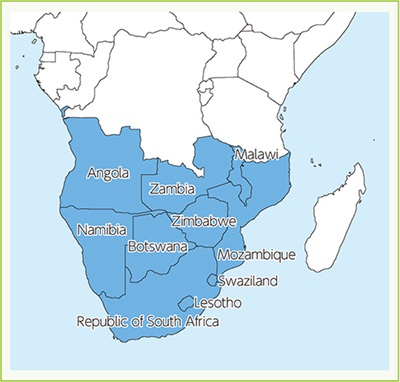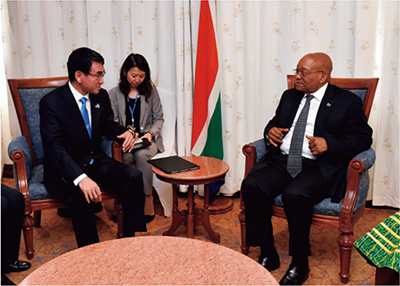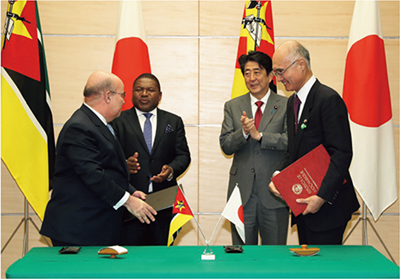Diplomatic Bluebook 2018
Chapter 2
Japan's Foreign Policy that Takes a Panoramic Perspective of the World Map
2 Southern Africa

(1) Angola
Angola has rich energy and mineral resources. Since the end of the civil war in 2002 the country has enjoyed a high economic growth rate. The drop in primary commodity prices in recent years has led to economic stagnation, and the Government of Angola is therefore placing emphasis on diversifying the country's industries.
The general election held in August resulted in the first peaceful presidential transition in 38 years. In September, State Minister for Foreign Affairs Sato attended the inauguration ceremony for President Lourenço as a Special Envoy of the Prime Minister, and reaffirmed with the new president the intention to cooperate on further strengthening Japan-Angola relations.
(2) Zambia
Zambia has maintained political stability since its independence in 1964. It has also contributed proactively to regional peace and security, mediating for peace among neighboring countries, accepting refugees, and so on. In June, Parliamentary Vice-Minister for Foreign Affairs Takei visited Zambia and held talks with Minister of Foreign Affairs Kalaba, and affirmed their intention to commence negotiations for a bilateral investment treaty. The first Japan-Zambia investment treaty negotiation was held in December.
(3) Zimbabwe
Although Zimbabwe's economy has stagnated due to political and economic turn off since 2000, the country has a great deal of potential thanks to its high level of literacy, wealth of resources, bountiful agriculture, and tourist attractions such as the Victoria Falls. A military intervention in November led to the resignation of President Mugabe, who had held power ever since Zimbabwe gained independence in 1980. In accordance with the constitution, former Vice-President Mnangagwa was subsequently inaugurated as president. It is hoped that, under the new administration, democratic and economic reform will be progressed.
(4) Namibia
Namibia boasts rich maritime and mineral resources. As the distribution hub for the Atlantic Ocean side of the Southern Africa Region, an expansion is expected in resource development as well as trade and investment in the energy field. In June, Parliamentary Vice-Minister for Foreign Affairs Takei visited Namibia and held talks with Prime Minister Kuugongelwa-Amadhila and Deputy Minister of International Relations and Cooperation Mushelenga, and affirmed the intention to further strengthen bilateral ties including economic cooperation.
(5) Malawi
Malawi's domestic politics have remained stable since gaining independence in 1964. Approximately 80% of the population engages in agriculture, and agricultural production accounts for 80% of total exports. Nurturing value-added industry as a way to earn foreign currency is the priority. There has been a notable level of people-to-people exchange at the grassroots level between Japan and Malawi, with more than 1,780 Japan Overseas Cooperation Volunteers (JOCVs) being dispatched to Malawi over the years, which is the highest in the number of JOCVs dispatched to a single country. Malawi was also the first African country elected for the One Village One Product project.
(6) South Africa
South Africa is the sole African country in the G20. It continues to garner attention from overseas companies including Japanese companies as a major economic power in Africa and as a base from which to carry out business expansion. At the National Conference of the ruling African National Congress (ANC) in December, Deputy Party President Ramaphosa, who visited Japan in 2015, was elected as the new party leader, replacing President Zuma, who had served as party leader for ten years.
During the TICAD Ministerial Meeting in August, Foreign Minister Kono made a courtesy call to President Zuma and also held talks with Minister of International Relations and Cooperation Nkoana-Mashabane.
 Foreign Minister Kono making a courtesy call to President Zuma of the Republic of South Africa (August 25, Maputo, Mozambique)
Foreign Minister Kono making a courtesy call to President Zuma of the Republic of South Africa (August 25, Maputo, Mozambique)(7) Mozambique
Mozambique is situated at the Indian Ocean coast and has a natural harbor that serves as a port which connects Southern Africa with Asia, the Middle East, Europe and elsewhere. It is a key country in the “Free and Open Indo-Pacific Strategy.” Japanese private companies have a high interest in Mozambique and are eager to invest by virtue of the country's rich natural resources.
2017 was the 40th anniversary of the establishment of the diplomatic relations between Japan and Mozambique, and a number of high-level visits were organized. In March, President Nyusi and his spouse visited Japan and held a Summit Meeting. On this occasion, Minister of Foreign Affairs and Cooperation Baloi also held talks with Foreign Minister Kishida, affirming the intention to further develop bilateral ties. TICAD Ministerial Meeting was held in Mozambique in August, and Foreign Minister Kono took the opportunity to make a courtesy call to President Nyusi and held talks with Minister of Foreign Affairs and Cooperation Baloi.
 The leaders of Japan and Mozambique attending a signing ceremony following their summit meeting (March 15, Tokyo; Photo: Cabinet Public Relations Office)
The leaders of Japan and Mozambique attending a signing ceremony following their summit meeting (March 15, Tokyo; Photo: Cabinet Public Relations Office)(8) Botswana
Botswana has maintained a stable political situation since gaining independence. Botswana's core industry is diamond mining, with the world's second highest diamond output. It has developed into a medium to high-income country. The Government is aiming to break dependence on diamonds by diversifying the country's industries and eliminating poverty. In 2013, the country became the first country in Africa to adopt Japan's digital terrestrial broadcasting (ISDB-T) system.
In January, Vice President Masisi visited Japan and held talks with Japanese Government officials including Deputy Chief Cabinet Secretary Hagiuda and State Minister for Internal Affairs and Communications Jiro Akama.
